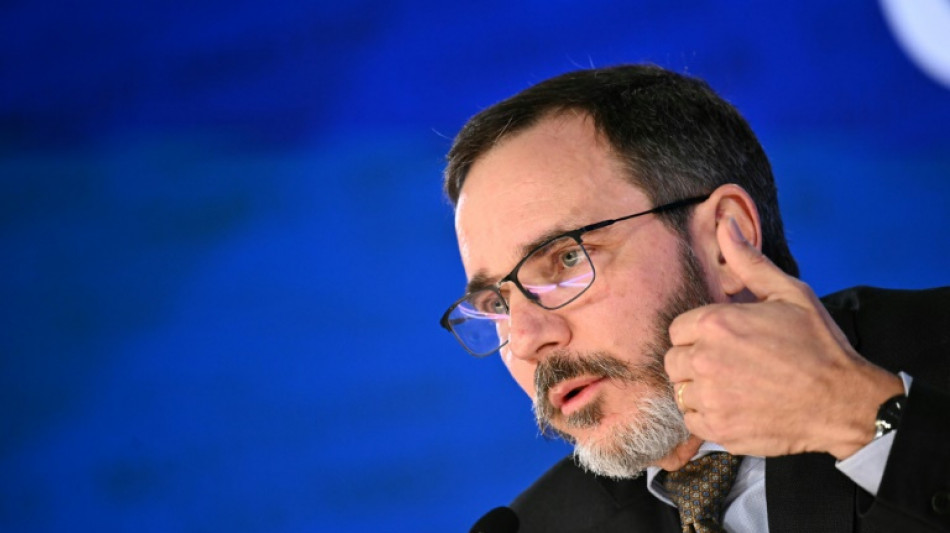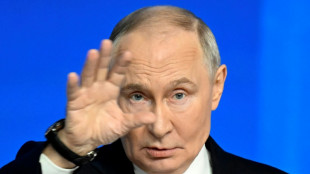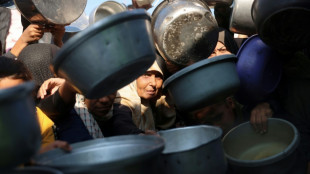
-
 Epstein files opened: famous faces, many blacked-out pages
Epstein files opened: famous faces, many blacked-out pages
-
Ravens face 'special' Patriots clash as playoffs come into focus

-
 Newly released Epstein files: what we know
Newly released Epstein files: what we know
-
Musk wins US court appeal of $56 bn Tesla pay package

-
 US judge voids murder conviction in Jam Master Jay killing
US judge voids murder conviction in Jam Master Jay killing
-
Trump doesn't rule out war with Venezuela

-
 Haller, Aouar out of AFCON, Zambia coach drama
Haller, Aouar out of AFCON, Zambia coach drama
-
Nasdaq rallies again while yen falls despite BOJ rate hike

-
 Bologna win shoot-out with Inter to reach Italian Super Cup final
Bologna win shoot-out with Inter to reach Italian Super Cup final
-
Brandt and Beier send Dortmund second in Bundesliga

-
 Trump administration begins release of Epstein files
Trump administration begins release of Epstein files
-
UN Security Council votes to extend DR Congo mission by one year

-
 Family of Angels pitcher, club settle case over 2019 death
Family of Angels pitcher, club settle case over 2019 death
-
US university killer's mystery motive sought after suicide

-
 Rubio says won't force deal on Ukraine as Europeans join Miami talks
Rubio says won't force deal on Ukraine as Europeans join Miami talks
-
Burkinabe teen behind viral French 'coup' video has no regrets

-
 Brazil court rejects new Bolsonaro appeal against coup conviction
Brazil court rejects new Bolsonaro appeal against coup conviction
-
Three-time Grand Slam winner Wawrinka to retire in 2026

-
 Man Utd can fight for Premier League title in next few years: Amorim
Man Utd can fight for Premier League title in next few years: Amorim
-
Pandya blitz powers India to T20 series win over South Africa

-
 Misinformation complicated Brown University shooting probe: police
Misinformation complicated Brown University shooting probe: police
-
IMF approves $206 mn aid to Sri Lanka after Cyclone Ditwah

-
 US halts green card lottery after MIT professor, Brown University killings
US halts green card lottery after MIT professor, Brown University killings
-
Stocks advance as markets cheer weak inflation

-
 Emery says rising expectations driving red-hot Villa
Emery says rising expectations driving red-hot Villa
-
Three killed in Taipei metro attacks, suspect dead

-
 Seven Colombian soldiers killed in guerrilla attack: army
Seven Colombian soldiers killed in guerrilla attack: army
-
Amorim takes aim at Man Utd youth stars over 'entitlement'

-
 Mercosur meets in Brazil, EU eyes January 12 trade deal
Mercosur meets in Brazil, EU eyes January 12 trade deal
-
US Fed official says no urgency to cut rates, flags distorted data

-
 Rome to charge visitors for access to Trevi Fountain
Rome to charge visitors for access to Trevi Fountain
-
Spurs 'not a quick fix' for under-fire Frank

-
 Poland president accuses Ukraine of not appreciating war support
Poland president accuses Ukraine of not appreciating war support
-
Stocks advance with focus on central banks, tech

-
 Amorim unfazed by 'Free Mainoo' T-shirt ahead of Villa clash
Amorim unfazed by 'Free Mainoo' T-shirt ahead of Villa clash
-
PSG penalty hero Safonov ended Intercontinental win with broken hand

-
 French court rejects Shein suspension
French court rejects Shein suspension
-
'It's so much fun,' says Vonn as she milks her comeback

-
 Moscow intent on pressing on in Ukraine: Putin
Moscow intent on pressing on in Ukraine: Putin
-
UN declares famine over in Gaza, says 'situation remains critical'

-
 Guardiola 'excited' by Man City future, not pondering exit
Guardiola 'excited' by Man City future, not pondering exit
-
Zabystran upsets Odermatt to claim first World Cup win in Val Gardena super-G

-
 Czechs name veteran coach Koubek for World Cup play-offs
Czechs name veteran coach Koubek for World Cup play-offs
-
PSG penalty hero Safonov out until next year with broken hand

-
 Putin says ball in court of Russia's opponents in Ukraine talks
Putin says ball in court of Russia's opponents in Ukraine talks
-
Czech Zabystran upsets Odermatt to claim Val Gardena super-G

-
 NGOs fear 'catastrophic impact' of new Israel registration rules
NGOs fear 'catastrophic impact' of new Israel registration rules
-
US suspends green card lottery after MIT professor, Brown University killings

-
 Stocks mixed with focus on central banks, tech
Stocks mixed with focus on central banks, tech
-
Arsenal in the 'right place' as Arteta marks six years at club


World could boost growth by reducing trade doubt: IMF chief economist
Policymakers should find a way to reduce the uncertainty over trade policy kicked up by Donald Trump's tariff plans in order to boost global growth, the International Monetary Fund's chief economist said in an interview.
"The uncertainty in trade policy, and in policy generally right now, is a big drag on global activity," Pierre-Olivier Gourinchas told AFP ahead of Tuesday's publication of the IMF World Economic Outlook report.
"And the sooner we can lift it, the better off everyone will be," he said, adding: "Bringing back stability, clarity, predictability to the trading system is the first order of business."
In the updated outlook published as global financial leaders gather for the World Bank and IMF Spring Meetings in Washington, the Fund sees global growth cooling to 2.8 percent this year, a 0.5 percentage-point cut from its last forecast in January.
Global growth is then forecast to hit 3.0 percent in 2026, a 0.3 percentage-point markdown from January.
- 'Delay easing monetary policy' -
The IMF now expects 3.0 percent inflation this year, effectively stalling progress towards the US Federal Reserve's two percent long-term inflation target.
Higher inflation "will, of course, have implications for what the central bank will need to be doing," Gourinchas said.
If inflation developments prove to be persistent, the Fed "may have to delay easing monetary policy, or they may even have to start looking to increase and tighten the monetary policy rate," he added.
The impact of tariffs is also "quite significant" for China, Gourinchas said, adding that the IMF expects the levies to constrain growth by around 1.3 percentage points, counteracted somewhat by the fiscal measures Beijing introduced to prop up the economy last year.
As a result, the IMF has trimmed China's growth forecast by 0.6 percentage points, and now sees growth of just 4.0 percent this year, down sharply from the 5.0 percent growth seen in 2024.
- More modest Europe downgrade -
Europe is "slightly less" exposed to tariffs than the United States or China, and as such the tariff shock should be a little less pronounced, Gourinchas said.
The increased European defense spending announced in recent months should also provide "some fiscal support to economic activity in the European Union," he added, while warning that any additional spending would still need to be paid for over the longer term.
"We need to have targeted measures, temporary measures, that are sunsetting automatically," he said.
"When it comes to the permanent increases in defense... it has to be financed out of expenditure cuts somewhere else or new revenues," he added. "It cannot be financed by debt."
- Risk of social unrest -
The IMF warned in its report of an increased risk of social unrest due to several factors, including "dim medium-term growth prospects."
For low-income countries, a funding squeeze combined with the effects of less foreign aid funding from the likes of the United States, could be a recipe for challenges ahead.
"There may be sectoral dislocations, and maybe sectors of activities that are hit pretty hard by the tariffs, if they remain in place," Gourinchas said. "And there will be calls for support so that these sectors, households and businesses can adapt and adjust."
"Some countries have very limited fiscal space to start with," he added. "And so in the context in which there will be these additional demands, if they are unable to meet them, then that's when you could see social tensions increasing."
J.Bergmann--BTB

